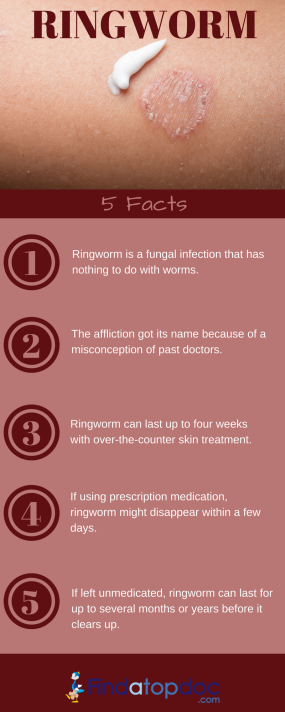Ringworm is a fungal infection of the skin. The name “ringworm” is a misnomer, since the infection is caused by a fungus, not a worm.
Ringworm infection can affect both humans and animals. The infection initially presents with red patches on affected areas of the skin and later spreads to other parts of the body. The infection may affect the skin of the scalp, feet, groin, beard, or other areas.
 Source
Source
Symptoms
Different types of ringworm affect different parts of the body.
- Scalp ringworm (tinea capitis): This is most common in younger children, and occasionally it affects adults. It is more common in urban environments where people live closer together, giving the fungus more opportunities to spread.
- Body (skin) ringworm (tinea corporis): This can affect infants, children, and adults.
- Groin infections (tinea cruris): Also known as jock itch, this is more common among young men.
Causes
Although the world is full of yeasts, molds, and fungi, only a few cause skin disease. These agents are called the dermatophytes. An infection with these fungi is medically known as dermatophytosis. Skin fungi can only live on the dead layer of keratin protein on top of the skin.
Diagnosis
A doctor can normally diagnose
ringworm or a groin infection after examining the affected area and asking the patient about their medical history and symptoms. They may take a small scraping of the skin, which will not hurt, and examine it under a microscope to look for characteristics of fungi. The doctor will assess whether the skin problem is being caused by some other disorder, such as psoriasis.
Treatment
Your doctor may recommend both medications and lifestyle adjustments to treat ringworm. Your doctor may prescribe various medications depending on the severity of your ringworm infection. Jock itch, athlete’s foot, and ringworm of the body can all be treated with medications, such as antifungal creams, gels, or sprays. Over-the-counter medications and antifungal skin creams may be recommended for use as well. Over-the-counter products may contain clotrimazole, miconazole, terbinafine, or other related ingredients.
